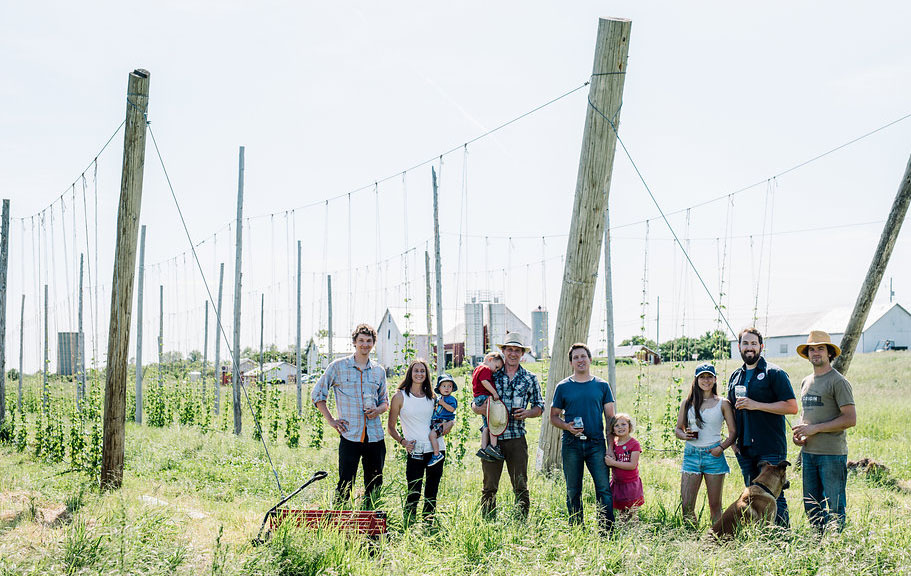Good Beer Grows Here
It’s early June at Ivan MacKinnon’s farm in Bath, Ont., the hops are just starting to climb their way up his trellises in a huge open field. It’ll be a while yet, but eventually they’ll become ingredients in the other business MacKinnon and his brother, Daniel, run on the farm: MacKinnon Brothers Brewing.
The brothers tend to an idyllic 1,300 acres of fields on which they grow barley, wheat, oats and soy beans. They also produce beer and run a brewery from the farm, and these days, they’re fashioning themselves into advocates for farmers and small brewers across the province.
The siblings are using more and more of their own products in their beer. They grow 50 acres of malting barley, a half-acre of hops and about 250 acres of wheat each year, all of which are added to the sudsy side of their business. You could call the pair small-scale vertical integrators of the sort that would make Warren Buffett proud.
Clearly, craft brewers can improve their profitability if they’re also growing their own ingredients for the beer they make, but MacKinnon has other motives as well: He wants to convince the Ontario government to let craft brewers like himself sell their wares at farmers’ markets, thereby cutting out the profit-depleting middle man, namely the LCBO. In addition, he wants the province to grant craft brewers the right to set up two additional retail storefronts, apart from their breweries, where craft brewers are currently allowed to sell directly to consumers. His pitch? We’ll include a certain percentage of Ontario-grown ingredients in our beer if you let us do this.
“We get a decent amount of foot traffic,” MacKinnon says, “but we’re in the middle of nowhere. Most of our beer goes to Kingston, so for us to have more retail presence there would be really valuable.”
MacKinnon is one of a small band of like-minded brewers involved in this campaign, which also includes the folks at Campbellford’s Church-Key Brewing and Ottawa’s Dominion City Brewing Co. Their cause has some precedent, too. Ontario wineries and cideries — provided their products are made with 100 per cent locally grown fruit and grapes — are now allowed to sell at farmers’ markets. And there are also independent wine shops, such as Wine Rack and The Wine Shop, that exist outside the LCBO, often in grocery stores.
Graham, who owns Church-Key Brewing Company, said he already has some products that are made of 100 per cent Ontario crops and that foot traffic is definitely a problem where he is.
“There would be more people walking by the Steam Whistle Brewing [in downtown Toronto] in an afternoon than there are walking by Church-Key in a 10-year period, I would posit,” he says, adding that access to the farmers' markets is what he’s primarily after. “If I don’t have the foot traffic coming to me, I want to go where there are people. You can already buy tomatoes on the end of a farm lane, but that guy can’t survive off that because not enough people come by. He needs to go to the farmers' market.”
At this point, MacKinnon and Graham have run the idea by a provincial policy adviser, who encouraged them to pursue it. The Ontario Hop Growers Association and the Grain Farmers of Ontario provided initial support and though the Ontario Craft Brewers showed some interest, it didn’t seem as though it was a priority for them. So, the small coalition is working to get more brewers on board, with a goal of corralling 25 before going back to the province.
It seems a natural time to further lobby the province around beer regulation. Notable recent changes include the provincial decision to allow some lucky grocery stores, at least on a pilot basis, to sell beer. There’s also the rule that once an Ontario brewer produces beyond 50,000 hectolitres, he or she may be eligible for the small beer manufacturers' tax credit.
However, it may be a slog. Asked about the possibility of allowing beer producers, who use 100 per cent Ontario-grown products in their beer, to sell in farmers’ markets, finance ministry spokesman Scott Blodgett would only respond by email. His response? “Only VQA wine and fruit wine (including cider) made from 100 per cent Ontario fruit may be sold at farmers’ markets.” Asked if the province was considering allowing breweries to have separate retail locations outside of their breweries, he wrote: “Allowing additional off-site stores is not being considered.”
The other goal of the brewers’ small campaign is to spur a resurgence in beer-related crops, brought on, they hope by the province granting this incentive to breweries to purchase malts, hops and yeast from local farmers and maltsters. When grown on a small scale, these beer-making products cost more, but many breweries are already sourcing locally, taking this extra cost into account. A provincially recognized accreditation, in the form of support that allows more independent retail, should encourage Ontario breweries to buy from suppliers, making it more economically viable for farmers to grow these crops and injecting the province’s farming community with a needed boost.
Dominion City Brewing Co. has made an effort to source as much locally grown material as possible from Day 1. The brewery even asks staff to help with the sticky job of picking hops in local yards.
“Brewing beer that reflects the land and the people that make it possible has really been at the core of what we wanted to do as a brewery from the start,” says Josh Mc- Jannett, co-owner and brewer of Dominion City Brewing Co. “We believe this idea of terroir — that characteristic taste and flavour imparted by the environment in which ingredients are grown — matters in beer. Supporting growers in our region, and in many cases, fuelling their growth and success is at the centre of our mission.”
While uncommon today, the practice of growing the ingredients and brewing the beer on the same property was often seen in Europe.
“The final products were only made for consumption on the farm and varied greatly in quality and style,” said beer expert and writer Crystal Luxmore. “They were mostly low-alcohol tipples designed to keep farmers satiated throughout the day and some workers drank up to five gallons of the stuff during busy harvest time.”
Beer styles, such as farmhouse ales or saisons, came from this tradition. The beers would often contain wild yeast strains or bacterial cultures that would add a particular funk to the flavour profile. Today’s farmhouse ales are often brewed in commercial breweries to emulate that funk, and the term “estate breweries” is gaining traction with a growing number of Canadian breweries that source their ingredients onsite.
MacKinnon Brothers Brewing qualifies for the term “estate brewery,” but its goals are loftier.
“The use of Ontario-grown ingredients in beer is a great way to strengthen the economy in rural Ontario,” MacKinnon says. “Giving farmers viable alternatives to what they’re currently growing helps diversify the agricultural industry and insulate from commodity price fluctuations and weather variations. Adding barley, a cereal crop, into cash-crop farm rotations also helps improve soil health and reduces the risk of herbicide-resistant weed development.”
The policy the Ontario breweries are seeking has inspiration just south of the border with New York State’s Brewery Association (NYSBA). The state’s 2012 Farm Brewing Law aimed to increase demand for local ingredients and boost the agricultural industry with the release of a farm-brewery licence.
To qualify for a licence, a New York brewery’s beer must be made with a sliding percentage of locally grown farm products. The percentage increases over time, starting at 20 per cent in 2012 and eventually climbing to 90 per cent by 2024. Breweries with this designation are allowed to sell beer by the glass at the brewery and can open multiple storefronts because these incentives provide an attractive financial return.
In four short years, the New York program has already seen a significant impact. The state currently boasts 326 breweries, 146 of which are operating with a farm-brewing licence. On the supply side, the state didn't have any operational malt houses prior to 2012. It now has 16.
Ontario has but one malting house, Belleville’s Barn Owl Malts, though others are hoping to open soon. While the number of Ontario hopyards is increasing, there are still only about 125 acres of them across this large province.
But Barn Owl Malts sees the possibilities. “In Ontario, close to 99 per cent of barley production [is] sold as feed and although we do have as many as 100,000 acres of barley planted in Ontario every year, a very small portion of that production is maltingspecific varieties,” says owner Devin Huffman. “Shifting to malting varieties carries greater risk, with lower yield potentials and high quality standards.”
With such a limited demand for malting barley, most farmers assess the risk level as unacceptable, Huffman said. But an initiative such as the NY state farmer’s brewery bill could potentially convince them to try moving to more acres to malting varieties. After all, the brewing varieties offer sellers a significant premium over feed barley.
Like malts, hops is another key beer ingredient in brewing that is underserviced locally. The Ontario Ministry of Agriculture, Food and Rural Affairs notes that Ontario hop imports climbed from $6,000,000 in 2011 to more than $15,000,000 in 2015, indicating there is a market.
In Campbellford, Lot 17 Hop Yard’s Adam Thomson agrees that a brewery-led initiative could help spur more growth. “We would absolutely benefit from [this] certification and it's interesting to see what the U.S. is doing to support their brewers, growers and farm-breweries,” Thomson says, adding that Virginia has also introduced legislation to propose a tax break for state hop and barley producers.
As momentum grows, it’s entirely possible more good beer will indeed eventually grow here.
Barn Owl Malt
224 Zion Rd., Belleville, Ont.
barnowlmalt.ca, 613.438.2114
Church-Key Brewing
1678 County Rd. 38, Campbellford, Ont.
churchkeybrewing.com, 705.653.9950
Dominion City Brewing Co.
Unit 15 - 5510 Canotek Rd, Gloucester, Ont.
dominioncity.ca, 613.688.6207
Lot 17 Hop Yard
Lot 17, County Rd. 38, Campbellford, Ont.
lot17hopyard.com
MacKinnon Brothers Brewing Company
1915 County Rd. 22, Bath, Ont.
mackinnonbrewing.com, 613.777.6277















